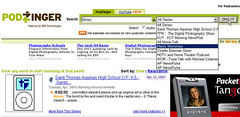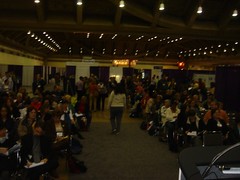One Slide Podcasting Presentation
Idea by Aaron Schmidt at CIL 2007 speaker's reception. I'm actually using it. But not alone.
See also...Robert Rodriguez's 10 Minute Film School.
Uploaded by dwfree1967
Labels: cil2007, podcasting, presentations
Random thoughts on libraries, librarianship, social computing, food, and music by David Free.
Idea by Aaron Schmidt at CIL 2007 speaker's reception. I'm actually using it. But not alone.
Labels: cil2007, podcasting, presentations
On Wednesday, May 9th, I'm presenting a webcast for ACRL called "The Library Will Now Be Podcast: Podcasting In Higher Education and Implications for Libraries". Why yes, I was on a Gil Scott-Heron kick when I came up with the title. Here's the description:
Podcasting is an emerging technology that allows for the easy online distribution of media files. The use of podcasts for both personal broadcasting and as a media tool has grown greatly in the past couple of years. Many institutions of higher education are now utilizing this technology as a method of distributing promotional and educational content. This webcast explores the growing usage of podcasting in higher education and examines how academic libraries fit into the educasting environment. The session focuses attention on examples of podcasts as classroom and library instruction tools and examines how academic libraries can become more integrally involved in podcasting efforts on their campuses.
This Webcast will last approximately an hour and a half.
Labels: podcasting, presentations
During our Podcasting and Videocasting Post Conference session at CIL, I had a couple of questions I wasn't really able to completely answer at the time about Podzinger. So I did a little research and hopefully this will cover it.

Labels: cil2007, podcasting
One of the best things about library conferences is meeting new people to add to your circle of friends to discuss and debate and commisserate and generally have fun. Among the great new folks I met at CIL this year were Ruth and Jenn from the Skokie (IL) Public Library. They're both very enthusiastic about implementing new programs and 2.0 tools at their library and generally making it better place for the community. Ruth is also a very good sport when it comes to actually doing silly stuff on camera in a workshop.
Both the podcast and awesome straw whistling videocast created by the audience at the CIL post conference are linked from my wiki page for the session. As is David Lee King's videocasting presentation.
Labels: cil2007, podcasting
Thanks to everyone who came to the Podcasting and Videocasting Postconference at CIL this week. I had a great time talking about podcasting with you. The conversation kept going over lunch, in the shuttle and at the airport too!
My presentation is vailable on SlideShare(the embedded player was acting weird,so I'm just linking to them). Additional information on podcasting tools and resources and links to the podcasts we talked about are available on the session wiki page. And there are pics on Flikr.
We made a great podcast and a great videocast during the session too! The audio is available on Blip.tv or in a previous post here. I'll post a link to the video when David King gets it up and running.
I thought the session went really well. Everyone seemed to be having a good time and learning at the same time. I'll post responses to a few of the questions over the weekend or early next week.
Thanks again for coming. I had a blast. Let me know if you have further questions as well!
Labels: cil2007, podcasting
Labels: cil2007, podcasting
Darien Library folks
Labels: cil2007
This was the greatest session in the history of...
Labels: cil2007, podcasting
...where the buildings are gray and the streets are windy.
Labels: cil2007, obscure song references
Barbara Fullerton, Sabrina Pacifici, Aaron Schmidt
Labels: cil2007
Jenny Levine, ALA
Marshall Breeding, Vanderbilt University
Labels: cil2007
Nicole Hennig, MIT Libraries
Labels: cil2007
Lee Rainie - Pew Internet and American Life Project
Labels: cil2007
As I was posting about the Princeton PL poetry podcast I remembered Chris Kretz mentioning that the Dowling College Library Omnibus was producing some National Poetry Month content too. They have three programs that they're releasing weekly for the rest of the month. In keeping with their focus on content local to Long Island, the first podcast features a reading/ interview with the local poet laureate. Nice.
There are many methods and techniques to help stimulate the creative process. Exquisite Corpse is one such, in which participants succesively contibute to a work of art (be it poem, painting or podcast) knowing only a fragment of the preceeding segment. In this case, we asked seven poets with connections to Long Island to collaborate via voicemail in a surrealist poetry/podcast experiment.
Labels: podcasting
The Princeton (NJ) Public Library is celebrating National Poetry Month with a podcast series featuring a reading by a different poet every day in April. Their blog for the project features pics and a little bio of the poets along with the text of the works read. What a great use of podcasting to highlight a cultural event. Hopefully they'll keep it up beyond this month.
Labels: podcasting
Do you work in an academic library setting? Does your library produce podcasts? If so, could you please take a few minutes and complete the following online survey? It'll be a great help in doing research for my book on podcasting in academic libraries.
Labels: podcasting
I've been super busy this week so haven't had a chance until now to post more about ACRL 2007. It's probably old news by now, but here goes. Probably the best session I went to was a discussion of how the University of Illinois at Urbana Champaign reconfigured their undergraduate library to meet the needs of millenial students. They didn't spend a lot of (or really any) time talking about the demographics of millenials so they were able to go into more detail about what they're doing at their library. They did a lot with the physical space and with things like gaming collections (complete with consoles).They showed a promotion video they made about the library too. Very cool. The video was pretty new and I couldn't find it online, but I'm sure it'll make the rounds at some point.
 My Cyber Zed Shed quickie talk about what we're doing with podcasting went OK. I thought my similiar Internet Librarian talk was better but hopefully folks got something out of this one too. The folks from Palinet recorded interviews with all of the speakers from the Cyber Shed and those should be available soon through the Palinet podcast site.
My Cyber Zed Shed quickie talk about what we're doing with podcasting went OK. I thought my similiar Internet Librarian talk was better but hopefully folks got something out of this one too. The folks from Palinet recorded interviews with all of the speakers from the Cyber Shed and those should be available soon through the Palinet podcast site.Labels: acrl2007, conferences, podcasting
The ACRL podcast interview with John Waters I mentioned a few days ago is now available on the ACRL podcast blog and presumably in iTunes. I just did the introduction and threw in a couple of questions, but it was fun to be involved and get to meet him. He was very pleasant, laid back and funny in person. I think the interview went pretty well, and he does actually talk about library issues some.
Labels: acrl2007, conferences, podcasting
I had a couple of questions at my ACRL Cyber Zed Shed session about where to find music that is OK to use in podcasts. And a couple of emails after the session. So I thought I would post the info here. This is by no means a complete list, but a good place to start.
Labels: podcasting
I just realized that I missed the one year anniversary of being peer pressured/ shamed into blogging at CIL last year! It was March 28. Ok, so I really started to see if I actually could do it for a while and apparently I can. So I guess I'll keep it up. I've got a couple more ACRL posts and a few other things in the works, but crazy busy work (plus presentation planning and writing other things) and crazy bad Internet access at home are going to put them on the backburner for a few more days.
Why yes, I am just getting around to posting an update on the second day of the conference. The couple of sessions I attended in the morning were OK. I did manage to get a few tips on gaming and getting training on library resources to distance learning faculty, but neither session really held my attention. The content was there but the presentation styles were somewhat lacking. I’m certainly not a stellar public speaker but I really do think that as academic librarians, we can do better than we do in this area, whether at a conference or in the classroom.
Labels: conferences, travel